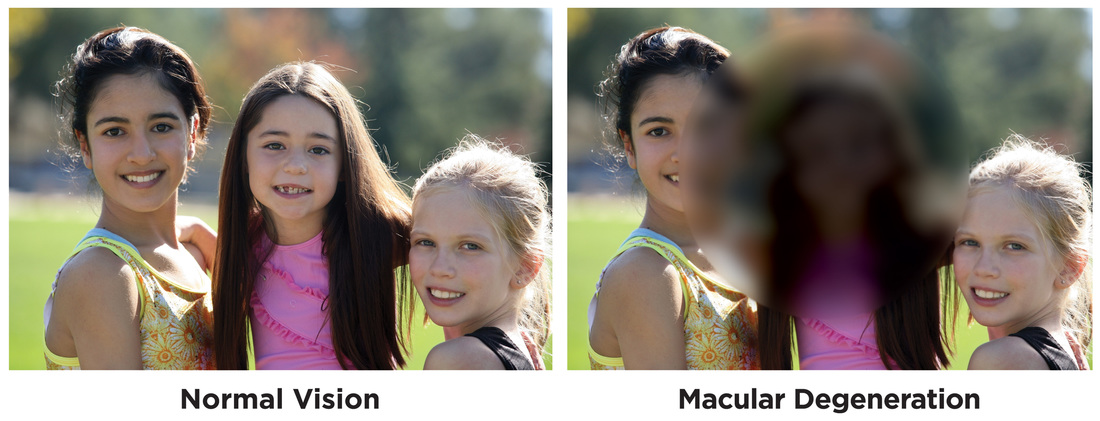|
The most common cause of blindness in people over age 50, macular degeneration affects millions of Americans to varying degrees. The macula is the central and most light-sensitive portion of the retina, which is located at the back of the eye. It controls the central field of vision and the ability to distinguish color and fine detail. When macular degeneration occurs, these basic functions of eyesight begin to break down. Objects in a person's central viewing area--things being directly looked at--appear blurred, gray, or simply blank, even though peripheral vision remains normal. As the condition progresses, it threatens the patient's ability to read, drive, watch television, or recognize people easily.
There are two forms of macular degeneration: "dry" and "wet," both of which are painless and usually affect one eye at a time. The dry, or age-related, form is so called because tiny bits of debris accumulate beneath the macula as it thins over time. Dry macular degeneration, which accounts for about 90% of cases, progresses slowly enough that most patients do not have serious loss of vision. In wet macular degeneration, new blood vessels develop under the retina and begin to push against it. The vessels can leak fluid, which is believed to cause scarring of the macula and result in permanent damage to central vision in a matter of days. Patients with dry macular degeneration may suddenly develop this fast-moving form. The principal damage in macular degeneration is probably caused by the unstable oxygen molecules called free radicals, which can be dangerous to many types of cells, not just those in the eyes. Environmental and lifestyle factors such as high dietary levels of saturated fat, tobacco smoke, and years of exposure to the sun's ultraviolet rays all encourage production of free radicals in the retina. Medical conditions such as high blood pressure, diabetes, and heart disease can also contribute to macular degeneration by restricting the supply of blood to the eye. Having light-colored eyes also increases the risk of macular degeneration, as does a family history of the disorder. In addition, advancing age magnifies all of these risk factors. About one-fourth of all Americans over age 65--a rapidly growing segment of the population--show some signs of macular degeneration, as do one-third of those over age 80. The most valuable antioxidant protection against macular degeneration is supplied by vitamins C and E and various carotenoids, all of which help neutralize the free radicals that can damage the retina. (These can all be supplied by a daily high-potency multivitamin such as the Nutritional Living Mega One 100.) Two carotenoids in particular, Astaxanthin and zeaxanthin, play an important role in macular function by blocking the sun's harmful ultraviolet rays. These substances provide the macula with its yellowish color. If you are using anticoagulant drugs, see your doctor before taking vitamin E. Zinc supplements help by not only correcting the deficiency of zinc that's common in older people, but also possibly by slowing the progress of macular degeneration. Along with all these supplements, take bilberry, an herb that supplies other antioxidant compounds and also improves blood flow to the eye. Two possible substitutes are grape seed extract, good for people with poor night vision, and gingko biloba, which may help those also experiencing memory loss (although neither is as effective against macular degeneration as bilberry). Remember the old saying, "An apple a day keeps the doctor away?" If you eat that apple--plus a banana and handful of grapes--you could reduce your risk of developing the eye problem called age-related macular degeneration when you reach your senior years. Age-related maculopathy, also known as macular degeneration, is a leading cause of blindness in older adults. A study from the Channing Laboratory at Harvard Medical School and Brigham and Women’s Hospital indicates that people who eat a daily diet that includes several servings of fruit reduce their risk of developing macular degeneration as seniors. The study looked at a group of men and women age 50 and older. It compared their intake of antioxidant vitamins and carotenoids (like beta carotene) as well as fruits and vegetables, and how these elements relate to the development of macular degeneration. Researchers discovered that people who consumed three or more servings of fruit per day over a period of 12 to 18 years reduced their risk of developing macular degeneration by more than 30%, compared to people who ate 1.5 servings per day or less. Fruit tastes great, it’s refreshing and it also includes vitamins and fiber that you need for general health. And as this study shows, having at least three servings of fruit per day may help your eyesight as you get older by helping to reduce your risk of developing macular degeneration. There is new evidence that by taking the sleep aid, melatonin can help improve and prevent macular degeneration. No one knows why, but I’ve talked with British doctors about this and they are convinced by what they see, no pun intended that melatonin could be the missing link in treating macular degeneration, in this case the 'wet' form of the disease.
0 Comments
|
Archives
May 2022
|

 RSS Feed
RSS Feed